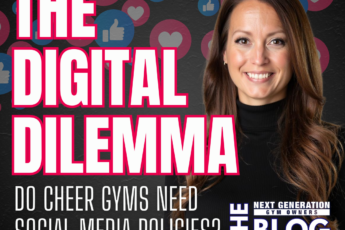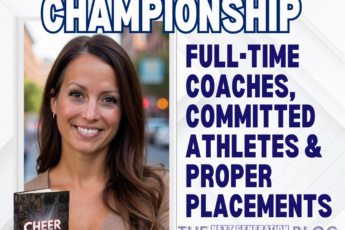This is a follow up from the Cheer Biz Podcast, “Hiring a Director Won’t Solve Your Problems” published on Spotify and Apple podcasts, Dec. 17, 2024.
Last week on “The Cheer Biz Podcast,” Dan Cotton told you that a director will not solve all your problems. He explained why and gave some great tactics for how to get to the point where you’re in a good position to hire a full-time director. I wanted to follow up on that podcast with some additional information.
Why Hiring Isn’t a Quick Fix
For years, we’ve told you that hiring great people is the #1 way to get tasks off your plate so you can focus more on the business (and I don’t mean giving up coaching altogether, but maybe only coaching the teams you’re extremely passionate about). However, I can tell you from personal experience that hiring someone is incredibly labor intensive.
Yes, reviewing resumes is a lot of work; so is conducting interviews. But more work than all of those things is systemizing the tasks this person will be doing, onboarding them so they clearly understand the culture and brand of your gym, and training them. In fact, the majority of owners I talk to who struggle with employees missed one of these crucial steps along the way. Most are still missing the training and accountability piece even once their staff member has been initially trained.
That said, Dan gave some great advice for essentially buying back some of your time so you can delegate important tasks. He explains that without solid systems and a training plan for the director you’re looking to hire, you’re going to create an enormous amount of work for yourself, and there’s a strong chance you’ll hire the wrong person altogether. Boy, was he right! I’ve done this before! When hiring someone for the front desk, we used to say it took a whole year to train someone; however, today, we have a much more solid training process and a variety of people who are qualified to train people in those tasks. We can have a front desk person up and going (and fully functioning in every capacity) in just a few months.
Rethinking the Director Role
In the episode, Dan recommended that you consider hiring a full-time coach to take some stuff off your plate. I’m going to follow that up with some additional thoughts.
What Tasks Do You Need Off Your Plate?
Look at the tasks you actually need someone to do and evaluate if you’re trying to hire the right position. I’ve had three all star directors in the past 13 years. All were promoted from within. They were great coaches who wanted to take on more of a leadership role. The first one would have been a great long-term fit, but her husband’s job took her overseas. The second and third lasted one season each. It turns out they loved coaching but weren’t big fans of the administrative side of the position. Realistically, my all star director does as much administrative work as coaching.
A Day in the Life of an All Star Director
Here’s what a day might look like for my all star director:
12:30 p.m. Report to work, review the action items, and plan for the day.
12:15 p.m. Begin replying to emails from parents, competition companies, uniform companies, bow companies, music companies and choreography companies.
12:50 p.m Work on upcoming competition registrations, travel accommodations, and staff schedules for events; put together competition schedules and information for parents for upcoming events, etc.
1:30 p.m. Review practice plans for teams.
2:00 p.m. Teach private lessons.
3:00 p.m. Meet with coaches for training or work on seasonal tasks and projects (examples below).
Seasonal Tasks and Projects
January: All star budget; benchmark meetings with parents, athletes and coaches
February: All star packet; facilitating feedback sessions with parents and coaches
March: Marketing for new season; end-of-season events; information meetings for parents
April: Marketing; end-of-season event schedules; information packet for parents; banquet prep; team apparel orders for the end of the season
May: Marketing and following up with leads for tryouts; tryout & evaluation schedule; flyers clinics (lesson plans and tryout schedule); banquet prep; five- and 10-year awards; prepping for welcome nights; uniform sizing for next season
June: Final uniform sizing; prepping uniform orders to go out; confirming all season down payments have been made; prepping camp and choreography schedule; summer benchmarks for teams and staff training
Learning from Past Directors
I just gave you half a year of projects my all star director works on; I definitely went off the top of my head rather than my full season all star checklist (available to our Academy members), so there is much, much more. My director is usually one of the busiest people in the gym.
However, what I learned with my two most recent directors is that they’re not fans of the administrative work, and as you can see, that’s as much of the position as the coaching—if not more.
A New Approach to the Director Position
Last May, when my director left, I decided I was going to change this position a bit. Note: I have 155 all star athletes, not hundreds, so this worked for me. Instead of hiring another full-time director, we beefed up our office staff and administrative team. These are the people who now do a large portion of the items above. I still do the staff training, and my head coaches have the knowledge to answer almost all of the questions parents ask, but many of the scheduling tasks, communication, spreadsheets, paperwork and other tedious projects can be done by part-time people who have a passion for administration. (Yes, those people exist. I’m one of them, so I know that!)
If you’re looking to hire a director or manager, think outside the box. Look at your best front desk people and find out what they want to do in the next five years. That’s how I pulled two of my three managers. Realistically, the more managerial of a position it is, the more administrative tasks will be part of the position. Administrative people are not expensive nor do they need a deep knowledge and understanding of our sport. They can be trained. Neither Lexi or Mel (two of the managers at my gym who are referred to in my podcast) have ever cheered a day in their lives, but both can answer 99% of the questions parents have. I don’t mind answering the other 1%.
So, consider what you actually need and make a training plan. If you have front desk people who would be great, consider testing them out by increasing their hours. We have front desk staff who come in at 2 p.m. so they can help with office tasks before classes and teams begin for the day. It lightens the load on my managers and myself, and it allows us to get more done and make delegation that much more effective!








